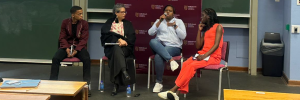
Transformation under the microscope at Student Transformation Indaba
- Students and staff call for transformation that extends beyond access and statistics to lived experiences and inclusion.
- Dialogue highlights the urgency of addressing financial inequality, accommodation challenges and collaboration across University structures.
- Calls for authentic leadership and a humanising culture that empowers students as co-creators of change.
Transformation at Stellenbosch University (SU) remains a central institutional priority and was brought into sharp focus during the recent Student Transformation Indaba 2025, a dynamic forum of debate and reflection that called on the University community to move “beyond numbers” and towards genuine belonging.
Held under the theme “What is Transformation? Looking at the Progress of the Institution Towards the Transformation Agenda from 2015 to Now”, the Indaba gathered students, staff and University leaders to interrogate what meaningful access and transformation should look like a decade after the start of major institutional reforms.
Beyond access: rethinking inclusion and lived experience
Opening the discussions, Prof Nico Koopman, Deputy Vice-Chancellor: Social Impact, Transformation and Personnel, traced the institution’s transformation journey since 2000, and highlighted the importance of collaboration between student leaders and staff. “We can never stop asking what kind of university we want to become,” he said, calling on participants to nurture a culture that “sees one another as fully human”.
The first panel, chaired by student Abongile Quthu, centred on access – not just to admission, but to meaningful participation. Registrar Dr Ronel Retief noted that access could not be reduced to numbers alone. “Access is not only about getting people into the system, but facilitating processes where students become partners in creating this space,” Retief said.
Chairperson of the Interim Executive Committee of the Student Representative Council (SRC) Simiso Langa echoed this, warning against abstract transformation rhetoric. “Can we be specific about what we want to transform?” she asked. “How do you quantify the ability to walk through campus and not feel that your race, gender or financial background defines your experience?”
Langa also spoke candidly about self-erasure. “To be comfortable in Stellenbosch, you sacrifice so much of your identity,” Langa remarked. “For the sake of comfort and self-preservation, you give up parts of yourself.”
Accommodation, funding and belonging
Across the discussions, access to accommodation and funding surfaced as defining issues. Retief said the emergency accommodation task team had already improved collaboration and reduced the burden on student leaders.
Advocate for disability inclusion Luigia Nicholas reflected on her decade-long experience at SU and the changes she has witnessed. “There has been a big push to improve policies and infrastructure, but we’re still struggling to change attitudes,” she said. Nicholas added collaboration and including student voices are key.
From a student perspective, the cost of belonging remained a recurring theme. “For many, residence is just a roof over their head, not a space of belonging,” said Quthu. House committee member Xavier Benyani added: “Some students have never attended a house party because they can’t afford it. “We need to rethink what inclusion looks like in everyday campus life.”
Representing the Development and Alumni Relations Division, Candice Eagan detailed how SU’s fundraising teams are working to align student needs with donor priorities. “There’s often a gap between what donors are willing to fund and what students need. Our role is to translate those needs into something that motivates giving,” she explained.
She cited the Bridge the Gap campaign as one effort to mobilise small, regular contributions to help students in financial distress. “Every level count,” she said. “Transformation also means ensuring that financial support systems reach the students who need them most.”
Renewed hope
Despite the challenges raised, the tone of the Indaba was one of optimism and renewed commitment.
Closing the session, Quthu issued a call to action: “There is no institution without students. If you want to change the system, start acting now. We can’t keep saying we’ll talk about it next year. Transformation, inclusivity, diversity – these are big words, but we must live them.”
The 2025 Student Transformation Indaba brought renewed hope, said organiser Simamkele Tozela, Transformation Manager of the 2024/25 SRC. “It demonstrated that management is willing to engage with students meaningfully to advance transformation. We appreciate staff who continue to show up and support students. Let us now strengthen collaboration, plan ahead, and ensure that SU becomes a more inclusive and responsive institution for all.”
